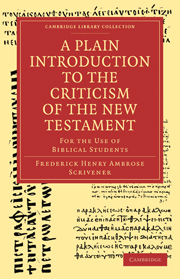Book contents
- Frontmatter
- ADVERTISEMENT
- ADDENDA ET CORRIGENDA
- Contents
- CHAPTER I PRELIMINARY CONSIDERATIONS
- CHAPTER II ON THE GREEK MANUSCRIPTS OF THE NEW TESTAMENT
- CHAPTER III ON THE ANCIENT VERSIONS OF THE NEW TESTAMENT IN VARIOUS LANGUAGES
- CHAPTER IV ON THE CITATIONS FROM THE GREEK NEW TESTAMENT MADE BY EARLY ECCLESIASTICAL WRITERS
- CHAPTER V ON THE EARLY PRINTED, AND LATER CRITICAL EDITIONS OF THE GREEK NEW TESTAMENT
- CHAPTER VI ON THE LAWS OF INTERNAL EVIDENCE, AND THE LIMITS OF THEIR LEGITIMATE USE
- CHAPTER VII ON THE HISTORY OF THE TEXT, INCLUDING A DISCUSSION OF RECENT VIEWS OF COMPARATIVE CRITICISM
- CHAPTER VIII ON THE PECULIAR CHARACTER AND GRAMMATICAL FORM OF THE DIALECT OF THE NEW TESTAMENT
- CHAPTER IX APPLICATION OF THE FOREGOING MATERIALS AND PRINCIPLES TO THE CRITICISM OF SELECT PASSAGES OF THE N. T.
- INDEX I
- INDEX II
- INDEX III
- Plate section
CHAPTER III - ON THE ANCIENT VERSIONS OF THE NEW TESTAMENT IN VARIOUS LANGUAGES
Published online by Cambridge University Press: 05 August 2011
- Frontmatter
- ADVERTISEMENT
- ADDENDA ET CORRIGENDA
- Contents
- CHAPTER I PRELIMINARY CONSIDERATIONS
- CHAPTER II ON THE GREEK MANUSCRIPTS OF THE NEW TESTAMENT
- CHAPTER III ON THE ANCIENT VERSIONS OF THE NEW TESTAMENT IN VARIOUS LANGUAGES
- CHAPTER IV ON THE CITATIONS FROM THE GREEK NEW TESTAMENT MADE BY EARLY ECCLESIASTICAL WRITERS
- CHAPTER V ON THE EARLY PRINTED, AND LATER CRITICAL EDITIONS OF THE GREEK NEW TESTAMENT
- CHAPTER VI ON THE LAWS OF INTERNAL EVIDENCE, AND THE LIMITS OF THEIR LEGITIMATE USE
- CHAPTER VII ON THE HISTORY OF THE TEXT, INCLUDING A DISCUSSION OF RECENT VIEWS OF COMPARATIVE CRITICISM
- CHAPTER VIII ON THE PECULIAR CHARACTER AND GRAMMATICAL FORM OF THE DIALECT OF THE NEW TESTAMENT
- CHAPTER IX APPLICATION OF THE FOREGOING MATERIALS AND PRINCIPLES TO THE CRITICISM OF SELECT PASSAGES OF THE N. T.
- INDEX I
- INDEX II
- INDEX III
- Plate section
Summary
1. THE facts stated in the preceding chapter have led us to believe that no extant manuscript of the Greek Testament yet discovered is older than the fourth century, and that those written as early as the sixth century are both few in number, and (with one notable exception) contain but portions, for the most part very small portions, of the sacred volume. When to these considerations we add the well-known circumstance that the most ancient codices vary widely and perpetually from the commonly received text and from each other, it becomes desirable for us to obtain, if possible, some evidence as to the character of those copies of the New Testament which were used by the primitive Christians in times anterior to the date of the most venerable now preserved. Such sources of information, though of a more indirect and precarious kind than manuscripts of the original can supply, are open to us in the versions of Holy Scripture, made at the remotest period in the history of the Church, for the use of believers whose native tongue was not Greek. Translations, certainly of the New and probably of the Old Testament, were executed not later than the second century in the Syriac and Latin Tongues, and, so far as their present state enables us to judge of the documents from which they were rendered, they represent to us a modification of the inspired text which existed within a century of the death of the Apostles.
Information
- Type
- Chapter
- Information
- A Plain Introduction to the Criticism of the New TestamentFor the Use of Biblical Students, pp. 226 - 282Publisher: Cambridge University PressPrint publication year: 2010First published in: 1861
